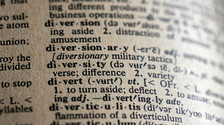azahrah.qolbaina
what the things that make verb 2 and verb 3 different
I was confised by verb 2 and verb 3. Can you explain it?
2012년 3월 16일 오전 11:16
답변 · 3
What is verb 1?
2012년 3월 16일
It sounds like you're asking about patterns like "see - saw - seen", or (Brad's example) "go - went - gone".
Basically, the past participle ("verb 3") always needs a helping verb. Always. It can't function without one. So you can say "I have seen" or "it is gone", but "it gone" and "I seen" are completely wrong; you need "it went" and "I saw" (simple past) in these cases.
You use the past participle in perfect tenses (I have seen; I had eaten; I will have spoken), hypothetical forms using "have" (I should have known; it could have sunk), or passive forms (it is known; that was eaten).
Verb 2 (past simple) is the basic past tense of the verb.
2012년 3월 16일
Are you talking about the simple past (e.g., "went") vs. the past participle (e.g., "gone")?
2012년 3월 16일
아직도 답을 찾지 못하셨나요?
질문을 남겨보세요. 원어민이 도움을 줄 수 있을 거예요!
azahrah.qolbaina
언어 구사 능력
아랍어, 영어, 인도네시아어, 터키어
학습 언어
아랍어, 영어, 터키어
좋아할 수도 있는 읽을거리

Top 6 Mistakes to Avoid with Vocabulary Acquisition
38 좋아요 · 10 댓글

Navigating Your First Job: Do's and Don'ts in the Workplace
47 좋아요 · 21 댓글

What Content to Watch to Acquire Advanced-level Proficiency
79 좋아요 · 50 댓글
다른 읽을거리
